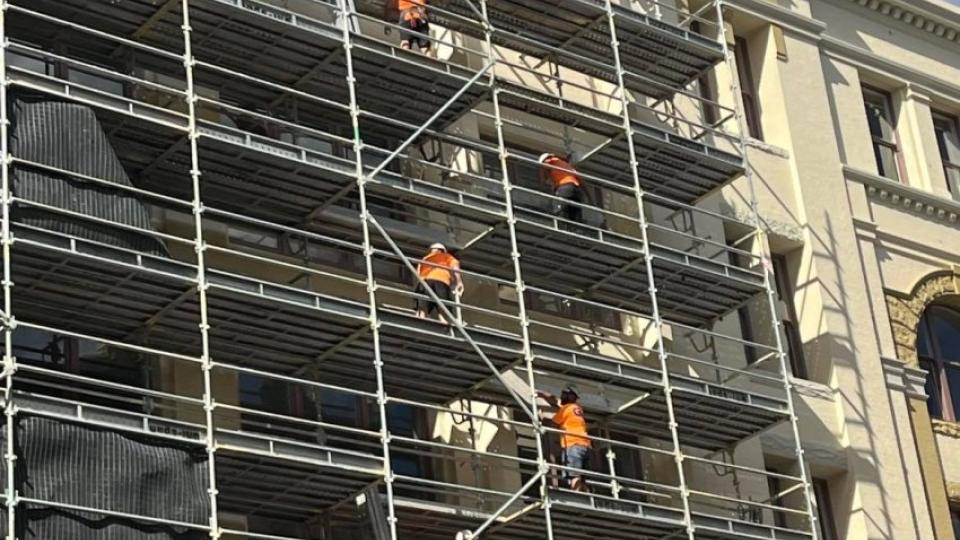We must hold Labor to account on IR reform

Workers are again watching the Coalition government use the election to attack unions and commit to further reduce workers’ pay.
Prime Minister Scott Morrison said on April 18 he wanted to tie pay rises for thousands of construction workers to minimum wage increases and lock in high levels of casualisation, labour hire and the use of temporary visa workers. Attorney-General Michaelia Cash has promised to double the fines on construction unions and individuals who break the government’s prohibitively defined industrial laws.
Construction unions are portrayed as thugs, serial offenders and law breakers and all unionised workers, but especially those in the construction industry, are being made scapegoats by a federal government seeking to distract from its policies of greater casualisation and inequality.
Labor leader Anthony Albanese has described the Coalition’s attacks on workers’ pay and conditions as “a disgrace”. He said the attacks would extend to all workplaces meaning pay cuts for all, especially where penalty rates apply. Labor’s Industrial Relations spokesperson Tony Bourke said Labor’s policies would deliver secure jobs, better pay and a fairer system.
The commercial construction industry in Australia is one of the most profitable, safe and productive in the world. The Construction Forestry Mining Maritime and Energy Union (CFMMEU) is revered by construction workers, and is the most militant union in the country.
For decades, the CFMMEU and its supporters in electrical, plumbing, construction and metals have been singled out for attack by governments because they are seen as pace-setters for wage rises and safety. Importantly, they have also challenged unfair industrial laws.
This is why former PM John Howard set up the Australian Building and Construction Commission in 2005. He used the recommendations from the Royal Commission into alleged misconduct in the building and construction industry, headed by Terence Cole, to impose special laws on unions in the construction industry.
But when the Kevin Rudd and Julia Gillard Labor governments rode to victory on the back of the Your Rights at Work campaign, rather than disband the ABCC, they maintained it in all but name. It was rebranded as Fair Work Building and Construction, but many of the ABCC's powers were kept in place.
Malcolm Turnbull’s Coalition government enacted laws in 2016 to “raise productivity” — read profits — in the construction industry which included bringing back the most coercive version of the ABCC.
Led by the CFMMEU, unions have fought long and hard against the ABCC since its inception. They have petitioned Labor since 2003 to abolish the ABCC and were angry when Gillard’s Labor government in 2009 described construction workers in Victoria as “violent” and that their tactics were intimidatory. Gillard retained the ABCC’s coercive powers but, under pressure, inserted a sunset clause and reduced the penalties for “unlawful conduct”.
Tucked away at the end of Labor’s Secure Australian Jobs Plan for this election is a promise to abolish the ABCC.
It states that union officials are being pursued over minor issues, while wage theft, sham contracting, worksite safety and deaths are largely ignored. It also argues that construction workers should have the same rights as other workers.
After nearly two decades of not supporting the abolition of the ABCC, or similar coercive body, this is a welcome change of heart. But given Labor’s track record, we should be more than a little sceptical: if elected, will Labor abide by its promise?
The Master Builders Australia, the construction bosses’ peak body, is mounting a significant campaign during this election campaign for Labor to retain the ABCC, arguing it will help the economy. It claims to have polled 40 marginal seats where builders and tradies say abolishing the ABCC will risk the recovery.
Given that Labor abandoned an earlier promise to review the JobSeeker rate if elected, it would not be a surprise if it quietly reviewed its position on the ABCC.
It is important that Labor be held to account. National Secretary of the CFMMEU Christy Cain told a recent rally in Melbourne that if Labor does not address attacks on workers and their unions during its term of office, workers would kick it out at the next election.
The only way workers can force Labor to stick to its promise on this and other anti-union laws, is to use its industrial power and mobilise.
Socialist Alliance wants all anti-union laws scrapped, and for workers’ right to strike and organise to be enshrined in law. We need to kick Morrison and the Coalition out, but that should not mean giving a blank cheque to Labor.
Holding Labor to account has to involve individual unions and the Australian Council of Trade Unions organising delegates’ meetings and mass rallies to pressure Labor to carry out its promises. As Cain said, workers and their unions will need to hold any future Labor government to account.
[Sue Bull is a long-time union member and educator and a member of the Socialist Alliance National Executive. Bull is standing in Corio for Socialist Alliance.]